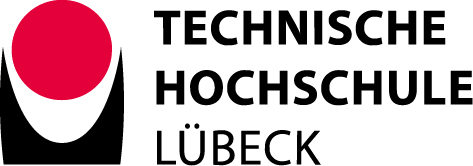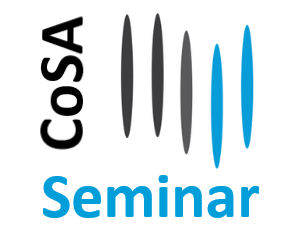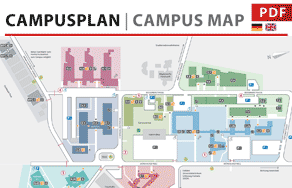hiermit laden wir zur 3. Auflage des CoSA-Seminar in der Studierenden-Edition am Montag dem 24. Februar 2025 um 11:45 Uhr ein. Das CoSA-Seminar findet in Präsenz im Raum 18-0.01 statt.
Im Seminar werden wissenschaftliche Beiträge der Studierenden, welche im Rahmen der Veranstaltung Scientific Project (Studiengang: AIT) erstellt wurden, vorgestellt.
Im Anschluss ab ca. 13:15 Uhr an die Vorträge präsentieren die Studierenden ihre Ergebnisse im Rahmen einer 30 minütigen Poster-Session im Erdgeschoss von Geb. 18.
Die Proceedings zur Veranstaltung finden Sie unter: https://cloud.th-luebeck.de/index.php/s/fm7BREZCEgzyfwP
Wir haben folgende Vorträge geplant:
- Lucas Bienert: SignalK for Inland Vessels: Sensor Integration and Data Communication
- Erik Kirchhefer: Finding an optimal SAT-Model for the Job Shop Scheduling Problem of Indirect Immunofluorescence Assays in Laboratory Automates with Area Conflicts
- Lukas Klapproth: Investigating the potential impact of increasing storage in an electrical grid, to reduce the load on the grid and to reduce fossil fuels used to generate electrical energy
- Marc Preschke: Replicating Real-World Network Labs with EVE-NG: Practical Exercise for Online Education
- Jannik Rittwage: Automated Room Geometry Modeling for UWB Single-Anchor Indoor Localization System
- Henrik Sawinski: Reinforcement Learning for a Futura Pendulum: Simulation and Evaluation for STM32 Microcontrollers
Die Vorträge dauern ca. 10 Minuten mit anschließend 2 Minuten Diskussion. Wir freuen uns auf eine rege und aktive Teilnahme.
Die Seminare sind auch auf https://www.th-luebeck.de/cosa/zu finden. Wenn Sie auch einmal einen Vortrag anbieten möchten, kontaktieren Sie uns gerne (fabian.john(at)th-luebeck.de).
Lucas Bienert: SignalK for Inland Vessels: Sensor Integration and Data Communication
The modernization of inland vessels is confronted with significant challenges due to the presence of proprietary protocols and the high costs associated with retrofitting. This paper presents a solution that utilizes SignalK, an open-source protocol, to integrate affordable Internet of Things (IoT) technologies for the collection of comprehensive sensor data. The proposed implementation utilizes a Raspberry Pi as the SignalK server and ESP32 microcontrollers as wireless sensor nodes, thereby demonstrating the feasibility of modern data acquisition without the need for extensive infrastructure modifications. Performance evaluations in various environments, including open field conditions, demonstrated stable communication up to 83 meters, suggesting the system's potential for use in maritime applications. The outcomes of this study underscore SignalK's capacity to facilitate vendor-independent sensor integration, support predictive maintenance, and contribute to the digital transformation of inland vessels, particularly in the context of autonomous navigation development.
Erik Kirchhefer: Finding an optimal SAT-Model for the Job Shop Scheduling Problem of Indirect Immunofluorescence Assays in Laboratory Automates with Area Conflicts
Indirect immunoflourescence assays are conducted, to diagnose malignant viruses or endogenous antibodies in patients. This is a complex process, involving many tasks with different resources. The challenge of finding an optimal schedule with a minimal length for this is an instance of the job shop scheduling problem. This is often formulated as a boolean satisfiability problem, which consists of different constraints between integer and boolean variables. Scheduling of immunofluorescence assays in automated laboratories has some specialties that differentiates it from the typical industrial job shop scheduling in production. For example, in the laboratory automates of EUROIMMUN, the slides that hold patient probes are the location at which two robot arms perform different tasks. The scheduling problem must be formulated so that collisions between them are prevented, while also ordering the tasks so that the time for the assessment is minimal. This work presents a way to accomplish that, by introducing a new set of constraints.
Lukas Klapproth: Investigating the potential impact of increasing storage in an electrical grid, to reduce the load on the grid and to reduce fossil fuels used to generate electrical energy
This paper investigates the impact of integrating energy storage systems into low-voltage grids to reduce dependency on the higher-level grids. The goal is to achieve theoretical autonomy for the low-voltage grid, while reducing transformer load at connection points. This study employs a two step approach: initially, a simplified network model aggregates all photovoltaic (PV) systems, storage units, and loads into unified components. Subsequently, a realistic network model is used. Both models assume fully controllable and grid-accessible storage units. Simplified assumptions, such as neglecting line capacity constraints (in the simplified model), are made to focus on the technical dimensioning of storage units. Simulation results demonstrate the potential of increasing PV power and storage capacities to significantly reduce grid dependency, improve energy self-sufficiency, and stabilize grid operations. Daily, weekly, non-seasonal fluctuations and seasonal variations in PV production and storage utilization are analyzed to identify critical design parameters. The findings underscore the feasibility of enhancing low-voltage grid autonomy and reducing reliance on fossil fuels, contributing to a sustainable energy future.
Marc Preschke:Replicating Real-World Network Labs with EVE-NG: Practical Exercise for Online Education
Practical exercises are essential in modern technical education, particularly in computer networking, where hands-on experience bridges the gap between theoretical knowledge and real-world application. However, traditional on-site lab environments face challenges such as high costs, limited accessibility, and logistical constraints, especially in the context of online education. This paper explores the potential of EVE-NG, a virtual lab platform, to replicate the learning outcomes of a real-world networking lab. Two established exercises focusing on key networking concepts, including switching and routing, were adapted from the real-world lab to the virtual environment. The adaptation process emphasized maintaining task fidelity while addressing resource limitations and platform-specific constraints. A comparative analysis of real-world and virtual exercises reveals that most tasks can be implemented, with only minor adaptations or exclusions required. These adaptations allow for an independent hands on learning experience similar to working in on-site labs, providing students with a deeper understanding of networking technologies while eliminating the dependency on physical infrastructure. The paper evaluates the pedagogical advantages and limitations of EVE-NG, discusses challenges encountered during implementation, and provides insights into the effectiveness of virtual labs in achieving critical learning objectives. The findings demonstrate the feasibility and practicality of virtual labs in enhancing accessibility and scalability for online education, offering a framework for future exploration and development.
Jannik Rittwage:Automated Room Geometry Modeling for UWB Single-Anchor Indoor Localization System
This work presents an automated approach to room geometry modeling aimed at enhancing the scalability of the Single-Anchor Localization System (SALOS). Leveraging 3D LiDAR technology, the proposed method captures, processes, and models room geometries with minimal manual intervention. The process begins with LiDAR sensors capturing point clouds from predefined grid positions, which are subsequently merged into a unified dataset. The system then identifies planes and extracts boundaries to estimate the room's geometry. The resulting models are integrated into the SALOS framework. To evaluate the method, the accuracy of the automated geometry was compared to manual laser distance measurements, achieving low root mean square errors. Furthermore, the localization accuracy of SALOS was tested using the automated and manually created room models, showing slightly improved performance with the automated approach. The system has considerable potential for applications in the automated capture of spatial models.
Henrik Sawinski: Reinforcement Learning for a Futura Pendulum: Simulation and Evaluation for STM32 Microcontrollers
The Furuta pendulum is a widely used benchmark system for testing advanced control algorithms due to its highly nonlinear dynamics and instability. This work explores the use of reinforcement learning (RL) to stabilize the pendulum in the upright position, with a particular focus on its potential deployment on a resource-constrained STM32 Nucleo F401RE microcontroller. To ensure safe and efficient training, a simulation was first conducted using Simscape Multibody. Subsequently, the ST Edge AI Developer Cloud Tool was used to analyze the transferability of the simulation results to a real STM32 microcontroller. The Twin Delayed Deep Deterministic Policy Gradient (TD3) algorithm was chosen due to its ability to handle continuous action spaces and improve learning stability. By employing two critic networks to mitigate overestimation bias and delaying policy updates, TD3 ensures more reliable training and better performance in complex control tasks, such as stabilizing the Furuta pendulum. Simulation results indicate that the STM32 microcontroller is capable of real-time control with low computational overhead and efficient resource utilization. However, training time was identified as a bottleneck, highlighting opportunities for optimizing the simulation environment. This paper first describes the modeling of the Furuta pendulum in Simscape Multibody and the design of the simulation environment. It then details the development of the TD3 agent, including network architecture, reward function design, and training process. Finally, the results are analyzed, discussing optimization opportunities and the future integration of the swing-up process to achieve full system mastery. This work contributes by presenting a cost-effective and flexible method for RL-based control of nonlinear systems, providing insights into hardware implementation on constrained platforms.


